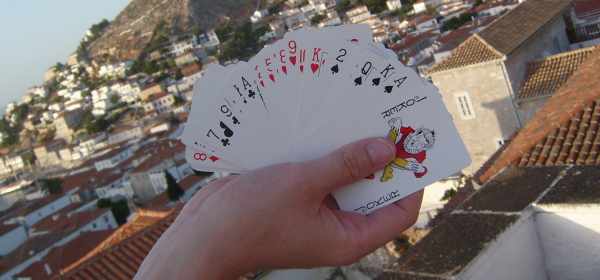7-in-1 Magnetic Family Game: Cards
This probably breaks the Trade Description Act on two points. Our final entry is neither a game nor magnetic.
At which point, you're probably wondering what I mean. Well, I mean that the cards aren't magnetic, which is a shame, as magnetic cards would be awesome. At which you will roll your eyes and say you meant the first half, you posturing ninny. At which point I punch your arm, and point out that cards are actually a device for playing a number of games.
In other words, cards are actually a format.
The nature of the format is what intrigues me. Cards have elements akin to both PC and console games. They're thoroughly reprogrammable to whatever sort of game you want to play with them. These games are freely distributable. As long as you know how to play any given game of cards, you can play it. However, there's also a really good actual DRM. The cards are hard to copy. Or rather, if you copy them, you have to copy them all. The fact that cards are indistinguishable from one another is a necessary part of most of the games you can play with them, which means it has to be an absolutely perfect copy. And you can't mix copied cards with ones you've bought. Generally speaking, it's easier to just buy a set of cards than try and copy 'em. However, it's also an open format. Anyone can manufacture and sell 'em. It's the 3D0 of boardgames, if we're following the analogy to its awkward close. It's a mature way of doing things. It's kind of a way I'd like gaming to go in, if I'm being perfectly frank - a good mix between standardization and freedom.
Another way that cards are like consoles is in how the format tends to overrule the actual game you're playing. Most people say that they're off to play cards rather than the game they're playing, in the same way that people talk that they're off to "Play Playstation" or whatever.
Then there's their iconic content. I talked about Chess being used as a signifier of things outside the game - that its components are interesting in and of themselves. The standard playing deck works in a similar way. Sure, there's other decks - and there's other designs for Chess pieces - but the standard, most familiar ones have a power outside of the games themselves. They're sexy objects. Seeing a girl with long sleeve tattoos up and down one arm, tattoos of a wall of cards, wasn't because she was a big fan of Pontoon or something. It's because she dug the iconography in and of itself.
I'm wandering on this one. I don't really have a destination here, which I suspect may be the point: cards, as a subject, is too big. The 7-in-1 pack details three games - Snap, Happy Families and Rummy. We only play the latter, as we're not quite dense enough for the former and are snobbish about any game called "Happily Families". At least Rummy sounds like it's a card game, y'know?
Also, the Lady is a little snobby about one-deck games. She's much more interested in multi-deck games she played with her Italian relatives, which sound like they're related to Rummy in the same way that Ludo is related to Backgammon. One is a suitable game for adults, and the other is more about introducing the idea of games to children.
Which is an intriguing one, innit? The idea of gaming literacy. As naturalised gamers, we're able to grasp concepts with incredible speed - which would be completely alien to those who've never played a game before. But we all learned stuff along the way. Some developers try and deal with us from scratch, but they're still basing their work on assumptions - like, say, you're able to hold a mouse, or know how to turn on a console, or are used to staring at a screen.
I often feel that there are games which, while you can learn to play from just the tutorials, you're not really appreciating them until you have obtained a wider variety of skills. Ones not taught in the tutorial. I appreciated Sacrifice much more when I returned to it, years later, for example. There are a variety of explanations for that, but I wonder whether it's mainly because I had a better handle on the RTS/action tropes it demands. I was better able to "read" Sacrifice, so got more out of it. Or... well, once you've learned to "read" one ASCII Rogue-like, you're able to process all the other ones, at least to a basic level. This is a different thing from saying that a game with a higher level of required literacy is a better game - but it's worth remembering. You need to have more tools in your reading box to grasp Nabakov over - say - Dickens, or more to read Dickens than - say - Caroll. It doesn't necessarily mean any of those books are better for the higher level of literacy required. It's just the entrance fee. It's an intellectual "You Must Be This High To Ride" marker. Though, much like reading, it's not actually a barrier to trying it. As my Sacrifice example earlier, I was quite capable of playing Sacrifice first time around - I just didn't enjoy it as much. You can read any book, but to actually enjoy it, you need to do more than just follow the words.
A couple of other things I find interesting about cards. One was a game which the Lady played and I didn't. As in, Patience. Of all the games in the box, Cards is the only one which foreshadows videogames in this way. I tend to think that what's most unique about videogames is the single player experience. Everything else is more traditional gaming but via a new technological channel. The possibility of playing a game with no other human involvement is something which I've often said videogames have allowed. And it's not that the computer is merely taking the role of a human opposition - it's doing a completely different job than just being an equal competitor to you. It's there to amuse you by presenting a series of challenges (some which may only *appear* to be challenges). Mostly, anyway: FPS bots would be an obvious exception. The computer AI in Civ4 or whatever... though they'll be somewhat naive. The computer isn't playing a game to beat you in Civ4, but to present an interesting experience to you. It's there to be character-ful. Anyway - point being, seeing something like Patience played, reminds me that my position is more bullshit than I'd like to admit. While technological possibilities put strict limitations on what they can do, single-player games without a real antagonist, which are more than just a puzzle, and closer to an experience, do exist. The point of Patience isn't really to solve it - as nice as that is. The joy of Patience is losing yourself in the sorting mechanism, the game's flow.
One final thing. When playing cards, the Lady and I found ourselves talking about Cards. I mentioned her games with her cousins before, but I was chewing over playing Crib with my Granddad, sixth-form center games of something frenzied I can't recall the name of now - alternating with tarot reading - and... well, I'm reminded of the other side of the literacy thing. That being, literacy as part of culture. Cards, as a concept, are a form of gaming which is part of life, part of our memories and gaming so ingrained in how the world works that no-one would ever thing of it really as gaming. In other words, it's gaming's real future if it even steps away from either niche or novelty.
Aces.


